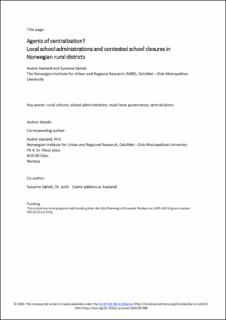Agents of centralization? Local school administrations and contested school closures in Norwegian rural districts
Peer reviewed, Journal article
Accepted version
Permanent lenke
https://hdl.handle.net/11250/2825550Utgivelsesdato
2020Metadata
Vis full innførselSamlinger
Originalversjon
https://doi.org/10.1016/j.jrurstud.2020.09.008Sammendrag
In recent decades, the number of schools in Norwegian rural municipalities has been reduced substantially, often accompanied by much contestation in the local community. In Norway's decentralized governance system, the municipal-level authorities have autonomy over decisions on school structure. However, municipal school administrations may have considerable indirect influence, inter alia in preparing the cases prior to meetings of the local council. This article examines experiences with, perceptions of and main concerns with school-closure processes among those handling school issues in the municipalities. It builds on an online survey of the local school administrations in Norwegian municipalities with fewer than 15,000 inhabitants, as well as case studies in three municipalities where school closure was or had recently been high on the agenda. Although the municipal school administrations recognize the importance of local schools for the communities, their primary concern is to secure a good learning and social environment for pupils, within the defined budgetary constraints. In contested cases, this usually leads them to side with politicians favoring closure. However, acknowledging the importance of the school for the community and the risks of local tensions, municipal school administrations also stress the importance of transparent and open discussions among those involved, before a decision is made.

